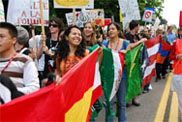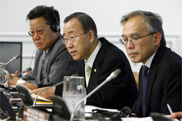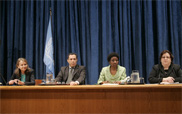DESA News
Volume 14, No.8 - August 2010
Feature articles

The International Year of Youth, commencing on the United Nations annual Day of Youth, 12 August 2010, celebrates and focuses on the importance of youth around the world. The contributions of youth to the Millennium Development Goals (MDGs) are fundamental for success and Youth Conferences with the United Nations reflect the role youth play in achieving development. Youth are the future of the UN, and the future of all development. Events surrounding this year aim to make young people more visible in the international development agenda.
In efforts to capture the energy, imagination and initiative of the world’s youth in overcoming the challenges facing humankind, from enhancing peace to boosting economic development, the United Nations proclaimed the International Year of Youth, which will commence on the 2010 International Day of Youth on 12 August under the theme “Dialogue and Mutual Understanding,”. The theme was chosen by the General Assembly out of appreciation for the value of dialogue among youth from different cultures as well as among different generations.
“Young people are the most important capital in the world’s history to change the future of humanity,” emphasize International Year of Youth campaign workers.
“On International Youth Day, let us renew our pledge to support young people in their development,” urged Secretary-General Ban Ki-Moon at the 2009 Youth Day Celebration. “They deserve our full commitment — full access to education, adequate healthcare, employment opportunities, financial services and full participation in public life,” he said.
The year is designed to encourage young people to dedicate themselves to fostering progress, including the attainment of the UN Millennium Development Goals (MDGs), which seek to improve the livelihoods of all humanity by slashing extreme poverty and hunger, decreasing maternal and infant mortality, improving access to education and health care, along with other more specific goals, by 2015.
Youth and the MDGs
Population statistics indicate that currently, 1.7 billion people — more than one-fourth of the world’s six billion people — are between the ages of 10 and 24, making this group of young people the largest ever to be entering adulthood and the largest underrepresented segment of the world’s population.
In an on-line consultation with more than 350 youth about development, most of the respondents said that they knew little or nothing about the MDGs. They also stressed that they do not have access to adequate resources for implementation and requested tools including internet access, access and training to information communication technologies (ICTs), business training and civic education, information sharing, and especially encouragement, funding and resources from government and institutions.
The International Year of Youth, and the theme to promote dialogue among youth and with the world, draws attention towards these needs. With only five years before the deadline set by the international community to achieve the development goals agreed in the year 2000, and such a large global young people population, it is recognized that a youth-oriented focus on these goals is required and essential for the efforts to be effective and progressive on a long term basis. Youth are the future.
Celebrations at the United Nations and around the world
The 2010 International Youth Day on 12 August will be celebrated at United Nations headquarters in New York with the global launch event of the International Year of Youth, where a photo exhibit entitled “Visual Voices – Youth perspectives on Global Issues” will be inaugurated in the UN visitors lobby and will be open to the public until early September.
The UN Inter-Agency Network on Youth Development is coordinating the activities for the Year, with DESA’s UN Programme on Youth leading this effort, striving to increase the effectiveness by strengthening collaboration and exchange among all UN entities working on youth. The UN Framework Approach for the International Year of Youth was adopted in February 2010 to provide a concrete framework for the efforts and to set strategic objectives. The Framework identifies the need to create awareness by increasing commitment and investment in youth; mobilizing and engaging youth by increasing youth participation and partnerships; and connecting and building bridges to increase intercultural understanding among youth.
The UN Programme on Youth is also providing activities for young people to get involved, including consultations on Facebook, where young people already contributed nearly 500 suggestions for the Year’s slogan “Our Year. Our Voice”. Each month, online consultations on topics related to the Year are held and contributions are included in the UN Programme on Youth’s monthly electronic newsletter “Youth Flash”.
Around the world, celebrations will continue to take place, including the 5th World Youth Congress in Turkey, the first Youth Olympic Games in Singapore and the World Youth Conference in Mexico. Local and regional level events are also being organized by young people as an opportunity for discussion and reflections regarding the role young people play in achieving development with special emphasis on the MDGs.
The International Year is about advancing the full and effective participation of youth in all aspects of society. All sectors of society are encouraged to work in partnership with youth and youth organizations to better understand their needs and concerns and to recognize the contributions that they can make to society.
The progress achieved during this year will lay the foundation for further work in youth development, including the implementation of the World Programme of Action for Youth and the achievement of the MDGs.
For more information:
Year of Youth website: http://social.un.org/youthyear/
To subscribe to the free e-newsletter “Youth Flash”, please visit: www.un.org/esa/socdev/unyin/flash.htm
To become a Facebook friend of the UN Programme on Youth, please visit: www.facebook.com/UNyouth
A calendar of youth events is available at: http://social.un.org/youthyear/
Research paper: http://www.equip123.net/equip3/docs/YAC/YouthandMDGs.pdf

In the framework of the 2010 Substantive Session, the Ministerial Declaration was adopted at the Economic and Social Council (ECOSOC) High-Level Segment on 2 July, calling for greater investment in women and girls in order to strengthen and advance gender equality and women empowerment. Under this premise, the 54 member Council supported the creation of the United Nations Entity for Women.
The new entity called UNWomen will focus on two key roles, said Asha-Rose Migiro, Deputy Secretary-General. “First, to support inter-governmental bodies in their formulation of policies, global standards and norms; and second, to help Member States to implement these standards, standing ready to provide suitable technical and financial support to those countries that request it, as well as forging effective partnerships with civil society”.
UNWomen will fuse the four agencies and offices currently related to women and girls worldwide: the UN Development Fund for Women (UNIFEM), the Office of the Special Adviser on Gender Issues, the Division for the Advancement of Women (DAW), and the UN International Research and Training Institute for the Advancement of Women (UN-INSTRAW).The body is the result of years of negotiations and will be based in New York, set to become operational in January 2011.
Apart from the High Level Segment, the ECOSOC Members also took part in the Dialogue of Regional Commissions and in the Coordination, Operational Activities, Humanitarian Affairs and General Segments during the Substantive Session from 28 June to 23 July.
Coordination Segment
Under Secretary-General of DESA Mr. Sha Zukang remarked that “the discussions, which built on the debates from the Council last year, emphasized the need to coordinate UN system-wide efforts on global public health. The health-related MDGs cannot be achieved by the 2015-target date without concerted action by all stakeholders”.
A panel on “Operationalizing the United Nations system’s short and long-term responses to the economic and financial crisis: Progress towards implementing the Social Protection Initiative and the Global Jobs Pact”. The panel focused its discussion on two of the Joint Crisis Initiatives being carried out by the CEB, namely the social protection initiative and the Global Jobs Pact.
The Council adopted a resolution on the follow-up to last year’s Ministerial Declaration on Global Public Health. Main highlights of the resolution included the need to place gender equality at the centre of the response to global health goals, and the importance for the UN system to continue coordinated action to respond to communicable diseases. The meetings also highlighted the ravaging effects of non-communicable diseases (NCDs) and the Council welcomed the decision of the General Assembly to convene a high-level meeting on NCDs in 2011.
Operational Activities Segment
The Operational Activities Segment represented a successful attempt to reinforce the synergy between policy dialogue and country-level realities. The strong representation of experts from capitals greatly enriched the Council’s work and once again attested to the continued commitment of Member States to the 2007 General Assembly Triennial Comprehensive Policy Review (TCPR) of UN system’s operational activities.
The panel discussions and general debate revealed important achievements made by the UN development system in pursing coherence, efficiency and effectiveness in its operational activities and showcased innovative approaches, including the “Delivering as One” pilot at country level. But there continues to be many challenges. The quality and quantity of funding for operational activities for development, as well as the fragmented architecture of funding, remain important issues.
With the conclusion of the GA’s consultations on system-wide coherence, there was strong expectation that the Council and GA would follow-up on the newly adopted GA resolution 64/289 on system wide coherence. The Council adopted the outcome, calling for further measures to ensure the quality of the work of the UN development system at country-level, the use of national expertise and capacities, and continued pursuit of efficiency.
Humanitarian Affairs Segment
The Humanitarian Affairs segment consisted of two panels, one on strengthening preparedness for humanitarian emergencies and the other about the challenges of conducting humanitarian operations in unsafe environments, with the case of Haiti, and a general debate. The main outcome was the adoption of a resolution which addressed issues related to operating in high-risk environments, vulnerability and global challenges, humanitarian leadership capacity, needs-assessments, education in emergencies, and emergency rules and procedures.
General Segment
The General Segment concluded the Session and reviewed the reports of its subsidiary bodies and other UN entities working in the economic and social fields, including the Council’s functional commissions, regional commissions, expert and ad hoc bodies. During the segment there was also a briefing on cybersecurity and a panel on Small Island Developing States (SIDS).
During the Joint Special Event organized by ECOSOC and the Peacebuilding Commission (PBC), Deputy Secretary-General Ms. Asha-Rose Migiro said that fostering economic development in countries emerging from conflict can only help to promote political and social stability, stressing the strong ties between poverty eradication and security. The President of ECOSOC, Mr. Hamidon Ali, added that more than half of the 34 countries farthest away from reaching the MDGs are either in the midst of or are emerging from conflict.
For more information: http://www.un.org/en/ecosoc/substantivesession/

On 2 July, the General Assembly voted unanimously to create a dynamic new entity to merge four United Nations offices focusing on gender equality.
“I welcome what will be an historic move by the General Assembly today in establishing UN Women, an entity designed to accelerate progress in meeting the needs of women and girls worldwide,” said the Deputy Secretary-General. “UN Women will give women and girls the strong, unified voice they deserve on the world stage. This is a positive and exciting moment for all the UN family and, I believe, for the world,” she added.



